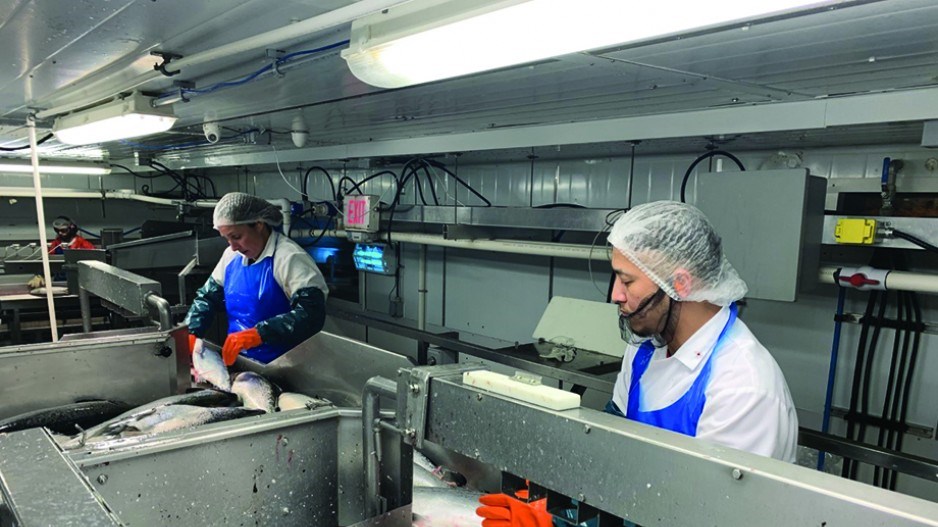While businesses shut down by the pandemic look to the provincial health officer for guidance on when they might slowly and cautiously reopen, many resource companies are looking more to global markets and balance sheets for that guidance.
Companies operating sawmills, mines and fish farms were deemed essential. They continued to operate, although with staggered shifts, enhanced cleaning and physical distancing rules in plants, mills and work camps.
Even if the provincial health officer gives resource companies the green light, some face the additional challenge of falling demand for commodities like lumber, copper and metallurgical coal.
For at least one business, Campbell River’s Brown’s Bay Packing Co. fish processing plant, the “new normal” may turn out to be preferable to how the plant used to operate.
Brown’s Bay Packing processes farmed salmon. The demand for farmed salmon shifted from restaurants to retail, but has not declined by much.
Before provincial workplace restrictions were instituted, Brown’s Bay went from single 10- and 12-hour shifts to two six-hour shifts and tripled its workforce, although workers now work fewer hours.
“It gave us an incredible amount of flexibility to manage work and life and pattern people through the plant on a much more spaced-out basis,” said Brown’s Bay managing director Dave Stover.
He doesn’t expect many changes at the plant, once pandemic restrictions ease.
Some resource companies were better prepared for the pandemic than others, and may therefore have an easier time easing back into normal operations.
Painted Pony Energy (TSX:PO-NY), a natural gas company focused on the B.C. Montney formation, had the foresight to put in place a business continuation plan that has allowed it to ride out the pandemic.
After floods in Calgary 2013, the company’s IT department devised a plan to allow most staff to work from home in the event of a fire, flood or even a pandemic.
As the pandemic and workplace restrictions took hold, the company went from core staff working from home to half of all staff and finally to everyone working from home, with the IT staff hooking up staff with computers and other equipment taken from their offices.
The company’s plan for resuming normal operations once pandemic restrictions are lifted is to back in the way it backed out: in stages.
B.C.’s forest industry may be the resource sector hardest hit by both workplace restrictions and falling demand for commodities.
Several forestry companies in B.C. began implementing two-week curtailments in March.
Canfor Corp. (TSX:CFP) reduced sawmill capacity for three weeks at its Canadian mills, but the company has since extended the curtailments. It has tentatively aimed to resume some operations at the beginning of May.
Others had not yet set dates for restarting as of last week.
“Housing starts have been impacted significantly by the pandemic, so markets have dropped off for sure,” said Susan Yurkovich, CEO of the Council of Forest Industries (COFI). “There’s been a mix of COVID closures and then market-related curtailments. Some operations are still curtailed because of market reasons.”
If B.C. forestry companies have plans for a restart, they are keeping them close to their chest. Asked what their post-pandemic plans are, none were willing to talk about them. All of their guidance in financial reports appears related to markets and balance sheets, not workplace restrictions.
As for mining, many B.C. mines have continued to operate pretty much as usual. But as with forestry, the industry could face uncertainties related to curbed demand for key commodities like copper and metallurgical coal.
“Fortunately, the majority of B.C.’s mines are continuing to operate,” said Michael Goehring, president and CEO of the Mining Association of BC. “Of course, a significant concern is future demand and price of metals and steel-making coal.”
This year, he said, “is done – it’s all negative.”
Centerra Gold Inc. (TSX:CG) was one of the companies that temporarily shut down some of its mining operations in B.C. as a result of pandemic restrictions. It halted mining operations at its Mount Milligan copper-gold mine in B.C. starting on April 6.
Although there were no outbreaks there, the company was taking precautionary measures, because the mine site is in a remote location where workers are bused in and out for two-week rotations and live in a work camp, said John Pearson, Centerra’s vice-president of investor relations.
The company sent 200 workers home after it shut down mining operations. It kept processing stockpiled ore, but then extended the shutdown with a mill maintenance program. Once the mill maintenance is done, Pearson said it will begin a “slow, gradual ramp-up after that.”
Even when the mining restarts, the company expects to maintain some of the measures that have been in place, like enhanced cleaning and social distancing.•
This story is part of a series on the next steps for B.C. businesses across a wide range of sectors as the province edges closer to the easing of COVID-19 safety measures. Check out all previous stories in this series, and stay tuned for further stories being published throughout this week.
Previous stories in the series:
B.C.’s road to recovery: Restaurant reopenings could start in May
B.C.'s road to recovery: Province’s fashion retailers face multiple barriers
B.C.'s road to recovery: Big energy projects await return to full power
B.C.’s road to recovery: Pandemic could usher in online era of property sales
B.C.'s road to recovery: Public confidence is key to B.C. tourism resurgence
B.C.’s road to recovery: Smaller crews, higher costs face post-pandemic film industry
B.C.’s road to recovery: Post-secondary schools focus on the fall
B.C.’s road to recovery: Governments peer anxiously at post-COVID-19 horizon
B.C.'s road to recovery: Stores envision phased retail reawakening
B.C.'s road to recovery: Personal care sector to remain six feet from normal
B.C.'s road to recovery: No easy road back for Canadian exporters




